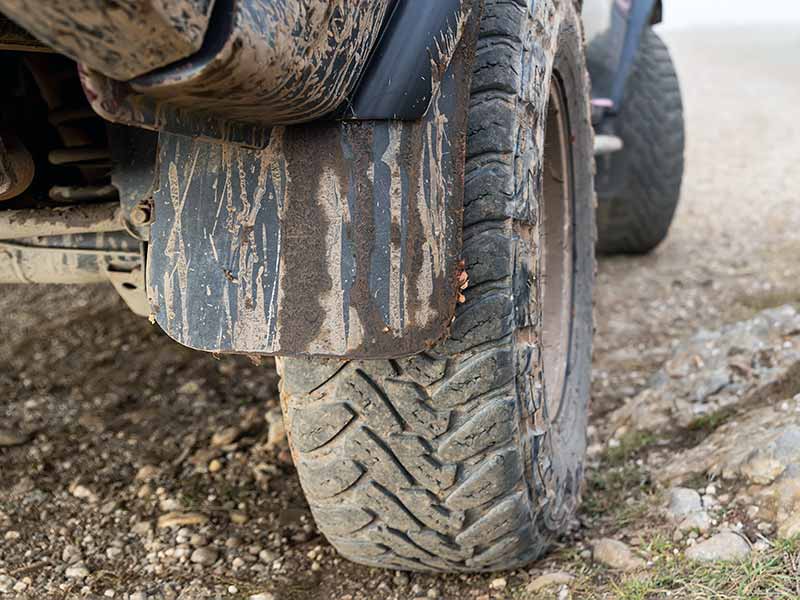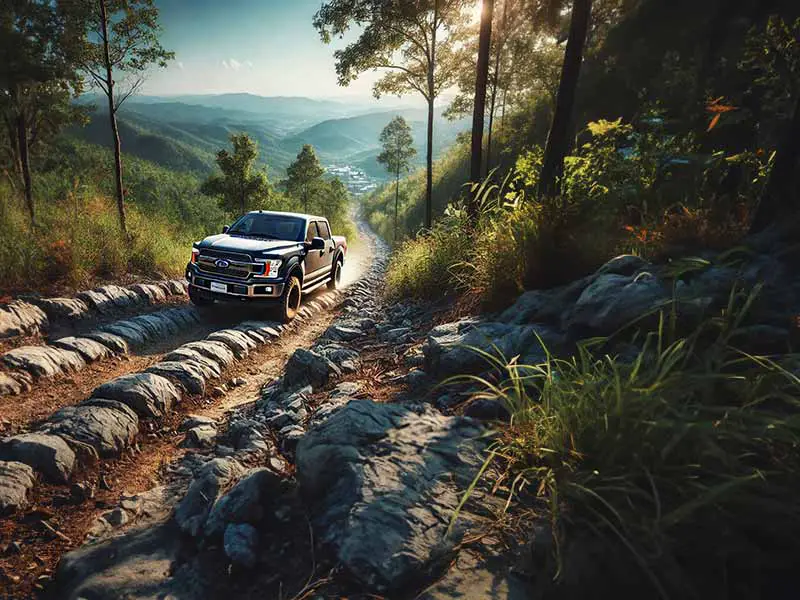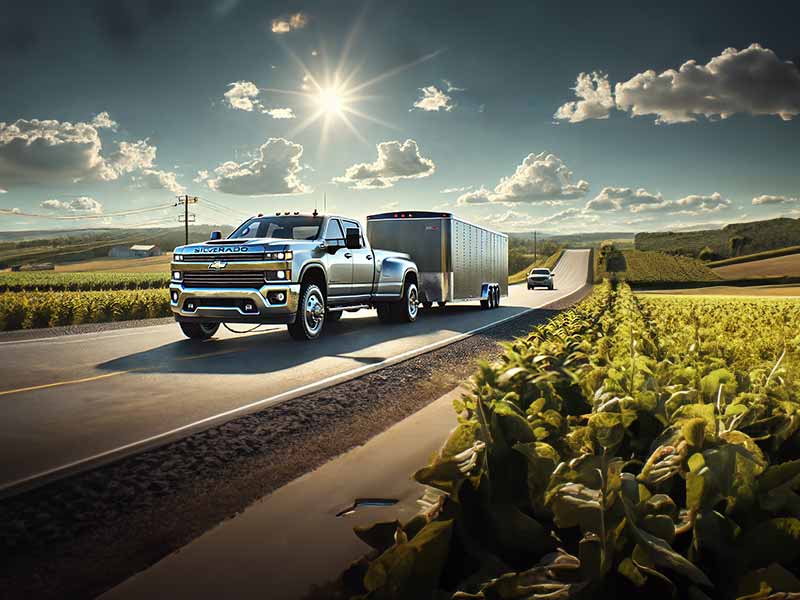Ever wondered if those rugged off-road tires you’ve been eyeing are suitable for your daily highway commute? You’re not alone. Many drivers find themselves torn between the allure of off-road capabilities and the practicality of highway driving.
Can I Use Off-Road Tires On The Highway?
Yes, you can use off-road tires on the highway, but they may wear out faster and decrease fuel efficiency compared to highway-specific tires.
In this article, we dive deep into the world of tires, exploring the differences between off-road, all-terrain, and highway tires. We’ll examine factors like longevity on pavement, impact on gas mileage, handling, and practical considerations to help you make the best tire choice for your vehicle.

Understanding Different Tire Types
When it comes to choosing tires for your vehicle, it’s like picking the right shoes for an occasion – you want to make sure they’re fit for the purpose. Let’s dive into the world of tires, focusing on three main types: all-terrain, off-road, and highway tires. We’ll look at what sets each apart, helping you make an informed decision for your driving needs.
All-Terrain Tires: The Jack of All Trades
All-terrain tires are the multitaskers of the tire world. Here’s what makes them stand out:
- Versatility: Designed for a bit of everything, from smooth highways to rugged trails.
- Tread Design: They have a unique tread pattern that balances on-road comfort and off-road grip.
- Durability: Generally made to be tougher than regular highway tires, handling varied surfaces well.
Off-Road Tires: For the Path Less Travelled
Off-road tires are your go-to if you’re an adventure seeker. Here’s why:
- Robust Construction: Built to withstand harsh, uneven terrain like rocks, mud, and sand.
- Aggressive Tread Pattern: Deep, wide treads for maximum traction in off-road conditions.
- Reinforced Sidewalls: Extra protection against punctures and damage common in off-road environments.
Highway Tires: Smooth Operators
Highway tires are designed for the everyday commuter. Here’s their claim to fame:
- Smooth Ride: Optimized for comfort on paved roads.
- Fuel Efficiency: Lower rolling resistance for better gas mileage.
- Longevity: They typically wear more evenly and last longer on paved roads.
All-Terrain vs Off-Road Tires: A Brief Comparison
While they may seem similar, all-terrain and off-road tires have distinct differences:
- Tread Depth and Pattern: Off-road tires have deeper treads for rugged terrain, while all-terrain treads are less aggressive, suitable for mixed use.
- On-Road Comfort: All-terrain tires offer a more comfortable ride on highways compared to off-road tires.
- Fuel Efficiency: Generally, all-terrain tires are more fuel-efficient on highways than off-road tires.

Lifespan of Off-Road Tires on Pavement
Now, let’s tackle a question many off-road enthusiasts and daily drivers alike ponder: “How long do mud tires last on pavement?” It’s important to understand that the lifespan of your tires on pavement can vary significantly based on several factors.
Factors Affecting Lifespan
The durability of off-road tires on the highway isn’t just a number; it’s influenced by several aspects:
- Tire Composition: Off-road tires are built tough, but their softer rubber compounds can wear down faster on hard pavement.
- Driving Habits: Aggressive driving, like rapid acceleration and hard braking, can shorten tire life.
- Maintenance: Regular tire rotations and maintaining proper air pressure can extend their lifespan.
Off-Road vs. Other Tires on Pavement
Comparing the longevity of off-road tires to highway and all-terrain tires on pavement reveals some interesting insights:
- Quicker Wear on Pavement: Generally, off-road tires wear out faster on pavement compared to highway and all-terrain tires due to their aggressive tread patterns.
- Mileage Expectancy: While exact figures vary, off-road tires might not reach the high mileage life that some highway-specific tires boast.
Balancing Performance and Wear
While off-road tires may wear down more quickly on highways, it’s about finding a balance based on your driving needs:
- Regular Off-Road Use: If you frequently hit the trails, the trade-off in highway tire life might be worth it.
- Predominantly Highway Driving: For those who rarely venture off the beaten path, all-terrain or highway tires might be a more cost-effective choice.

Performance Factors
When we talk about performance factors of tires, we’re not just referring to how they handle off-road terrain or smooth highways; it’s about understanding their overall impact on your driving experience. Let’s delve into the key aspects: gas mileage, handling, and comfort.
Gas Mileage Impact
One of the most common questions is, “Does the type of tire affect gas mileage?” The short answer is yes, and here’s why:
- Rolling Resistance: Off-road tires have higher rolling resistance due to their aggressive tread, which can reduce fuel efficiency.
- Weight: They are often heavier than standard highway tires, further impacting fuel consumption.
Handling and Safety
The type of tire you choose directly affects your vehicle’s handling, especially on highways:
- Off-Road Tires: Provide excellent grip in rugged conditions but may offer less precise handling on paved roads.
- Highway Tires: Designed for optimal handling, stability, and braking performance on paved surfaces.
- All-Terrain Tires: Strike a balance between the two, offering decent highway performance while still being capable off-road.
Noise and Comfort
The comfort of your drive is significantly influenced by your choice of tires:
- Ride Quality: Off-road tires can produce more road noise and a rougher ride on highways due to their tread design.
- Vibration: The aggressive tread patterns can also lead to more vibration, impacting overall comfort.
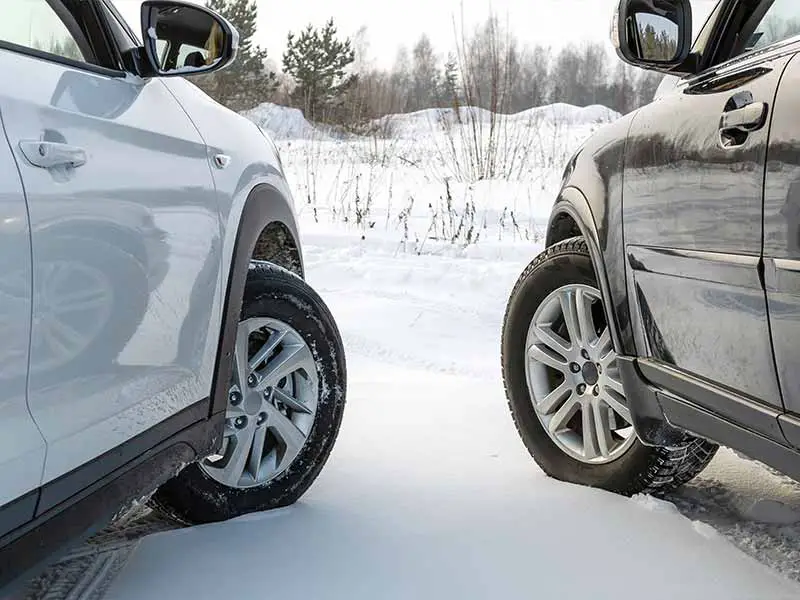
Practical Considerations
Choosing the right tires is not just about performance and durability; it’s also about practicality. In this section, we’ll explore some of the key practical considerations when deciding whether to use off-road or all-terrain tires for highway driving.
Are All-Terrain Tires Good for Highway Driving?
This is a question we often hear, and the answer is quite straightforward:
- Balanced Design: All-terrain tires are engineered to perform well both on and off the road.
- Comfort and Noise: They generally offer a more comfortable ride with less noise than off-road tires on highways.
- Fuel Efficiency: While not as fuel-efficient as highway tires, they still perform reasonably well in this regard.
Do All-Terrain Tires Wear Faster on the Highway?
Understanding tire wear is crucial for budgeting and maintenance:
- Wear Rate: All-terrain tires can wear faster on the highway compared to dedicated highway tires, but usually not as quickly as off-road tires.
- Factors Influencing Wear: Driving style, tire maintenance, and road conditions play significant roles in determining how fast your tires wear down.
Cost-Efficiency
The decision often comes down to cost, so let’s break it down:
- Initial Cost vs. Longevity: While off-road and all-terrain tires might have a higher initial cost, their versatility can offer value for money, depending on your usage.
- Fuel Consumption: Remember, the increased rolling resistance of these tires can lead to higher fuel costs over time.
- Replacement Frequency: Considering how often you’ll need to replace your tires based on your driving habits is key to understanding the total cost of ownership.
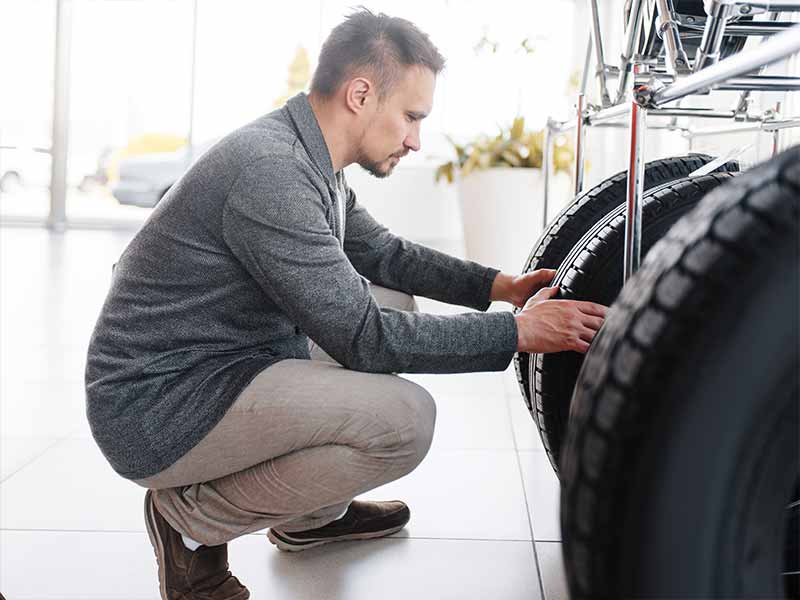
Making the Right Choice
When it comes to tires, the “right choice” isn’t a one-size-fits-all answer. It depends on your individual driving habits, preferences, and the conditions you usually encounter. In this section, we’ll provide guidance to help you weigh the pros and cons and make an informed decision that suits your specific needs.
Personal Needs Assessment
Before diving into the different tire options, consider your driving routine:
- Driving Environment: Do you mostly drive on highways, or do you frequently venture off-road?
- Weather Conditions: Consider the climate and weather conditions in your area.
- Vehicle Type: The make and model of your vehicle can also influence the best tire choice.
Pros and Cons
Let’s summarize the advantages and disadvantages of using off-road and all-terrain tires on highways:
Off-Road Tires
- Pros:
- Unmatched performance in rugged terrain.
- Durable construction for tough conditions.
- Cons:
- Faster wear on highways.
- Lower fuel efficiency and increased noise.
All-Terrain Tires
- Pros:
- Versatile for both off-road and highway use.
- Better fuel efficiency than off-road tires on highways.
- Cons:
- Might not perform as well as highway tires on paved roads.
- Can wear faster than highway tires.
Highway Tires
- Pros:
- Optimized for comfort and fuel efficiency on paved roads.
- Longer lifespan on highways.
- Cons:
- Limited off-road capabilities.
- Not ideal for rough terrains.
Resources
Below are some links you may find helpful when learning about tires:
- Mud terrain tires vs. all terrain tires: Pros and cons – Discount Tire
- The right off-road tires for your crossover – Autoweek
Final Thoughts
Choosing the right tires for your vehicle is a decision that blends practicality with performance. While off-road tires offer unparalleled ruggedness for off-the-beaten-path adventures, they come with certain trade-offs on the highway, such as increased wear and reduced fuel efficiency. All-terrain tires, on the other hand, provide a middle ground, offering reasonable highway performance while still being capable off-road. Ultimately, your decision should be guided by your personal driving habits, vehicle type, and the conditions you frequently encounter.
Remember, while the allure of off-road tires is undeniable, understanding their impact on everyday driving is crucial. Balancing their rugged charm with the realities of highway wear and fuel consumption will ensure that your tire choice is not only an informed one but also a decision that enhances your driving experience in the long run.
Good luck and happy motoring.
